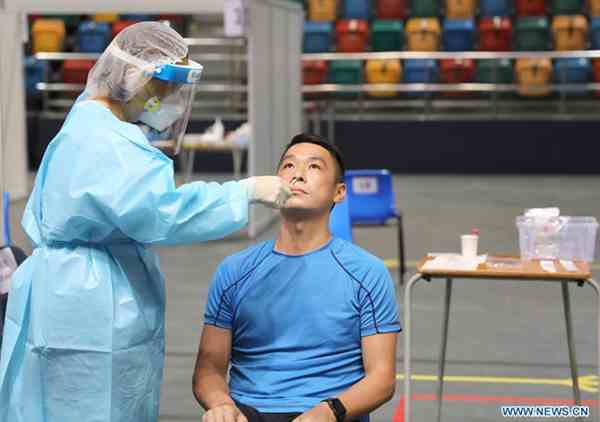A massive screening program was launched in Hong Kong Tuesday to curb the spread of the COVID-19 pandemic and restore the normal lives of residents.

A resident takes a COVID-19 test at a testing station at the Queen Elizabeth Stadium in Hong Kong, south China, Sept. 1, 2020. Hong Kong launched its massive screening program on Tuesday to help curb the spread of COVID-19 and restore the normal lives of residents. (Xinhua/Wu Xiaochu)
The Universal Community Testing Programme (UCTP), under huge support from the Chinese central government, offers free COVID-19 testing for citizens at a total of 141 testing centers.
It is reported that as of the evening of Sept.1, over 650,000 had finished preregistration for the program, and 82,000 had been tested.
One of the testing centers is located at the Queen Elizabeth Stadium. According to the chief of the center, all chairs in the center's waiting area are 2 meters apart from each other, and the waiting area is also separated from the testing area by alert tapes.
Rooms are separated in the testing area, and citizens must follow the one-way directing signs on the floor during the whole process of testing to avoid cross infection, the chief told People's Daily, adding that all facilities that citizens might touch are disinfected regularly by staff members.
The center received the first batch of citizens who had preregistered at 8:00 am on Sept. 1. The citizens entered the stadium after showing their IDs and had their temperatures measured.
Tung Chee-hwa, vice chairman of the National Committee of the Chinese People's Political Consultative Conference, also took the test on Tuesday morning at the testing center at the Hong Kong City Hall. He called on citizens to offer mutual help and jointly combat the virus. He also urged more people to participate in the program for the benefit of Hong Kong.
Thanks to the support of the central government, Hong Kong can now carry out universal community testing, said Chief Executive of Hong Kong Special Administrative Region (HKSAR) Carrie Lam when receiving test at a testing center in Hong Kong's Central Government Offices CGO with other officials on Sept. 1.
The massive testing helps epidemic response and is beneficial for the society, Lam said, adding that it will also help Hong Kong achieve an early victory over the virus, restore economic activities, and return normal lives to Hong Kong citizens.
On the same day, Gabriel M Leung, dean of the Li Ka Shing Faculty of Medicine under the University of Hong Kong, as well as respiratory medicine professor David Hui S. C. with the Chinese University of Hong Kong went to a testing center in Sha Tin District and sampled each other.
Hui introduced that medical workers will took samples of the citizens at an anterior part of their nasal cavity or throat, which not only improves the testing accuracy, but also lowers their discomfort.
Faster tracking and more thorough testing will make it quicker to spot silent infections, said Leung, who believes the UCTP is of huge significance. He hopes regular testing can be carried out for high-risk groups after the massive screening program.
At present, UCTP advertisements are seen everywhere in Hong Kong. Social organizations also put up posters and set up stands on the streets to help citizens register for the program.
A woman surnamed Huang who participated in the program said the testing not only assures the testees, but also helps the entire society.
"The UCTP has created a better condition for the phased resumption of school to be started in late September," said Kevin Yeung Yun-hung, the HKSAR's Secretary of Education. The education industry might make the testing a regular activity in the future as it helps cut social spread of the virus and control the epidemic, he added.
Spokesperson of Hong Kong Hospital Authority noted that the program dovetails with the epidemic control policy of "early identification, early isolation and early treatment," and will help identify and eliminate the invisible transmission link in the community. By managing the epidemic, pressure of public hospitals can be alleviated and normal operation can be resumed as soon as possible, the spokesperson added.
Currently, over 6 000 healthcare personnel have enrolled to participate in the UCTP. Some 4 000 government staff members from 75 bureaus and departments will also take up administrative support and management duties at the community testing centers.
Chief Secretary for Administration Matthew Cheung Kin-chung thanked the serving and retired civil servant colleagues as well as the healthcare personnel for their active participation in the preparation and management, appealing to members of the public to actively participate in the UCTP.
Citizens participating in the program said that the central government offered help every time Hong Kong encountered difficulties, which enhanced their confidence in defeating the virus.
According to those who completed testing, the testing was smooth and enough prevention measures had been taken at testing centers. The whole process could be completed in 10 minutes, from identity verification to sampling, and the testees are spaced out at an interval of over 1.5 meters, they introduced.
"It's an obligation of citizens to join the testing. The more people participating, the more possible it will be for us to cut the social spread of the virus and achieve an early victory," they said.
(People's Daily)







